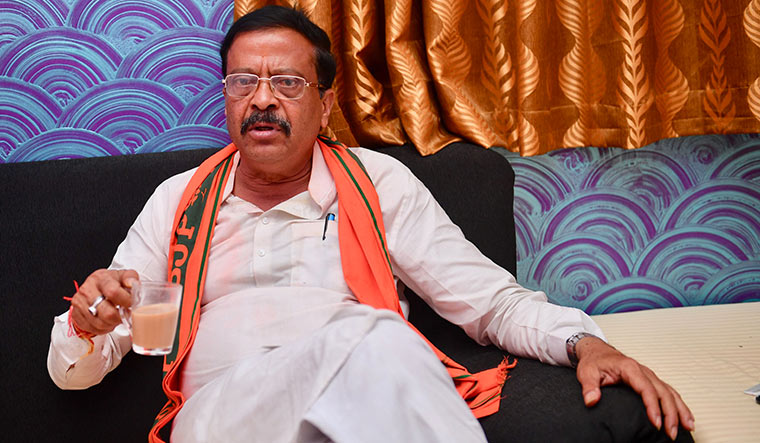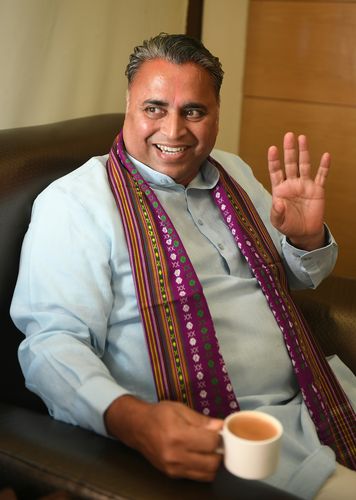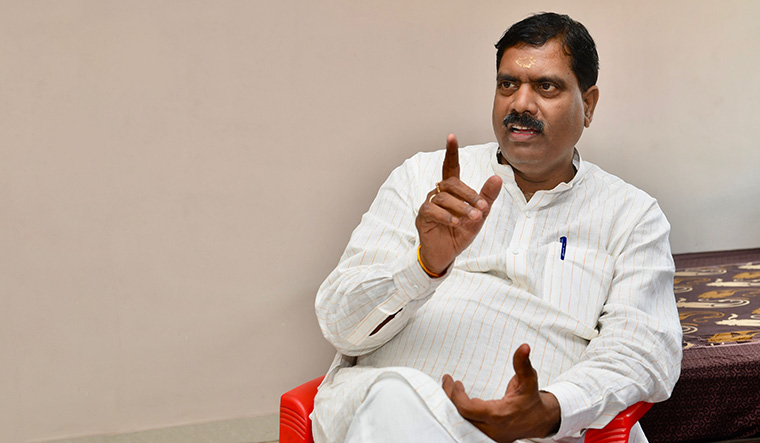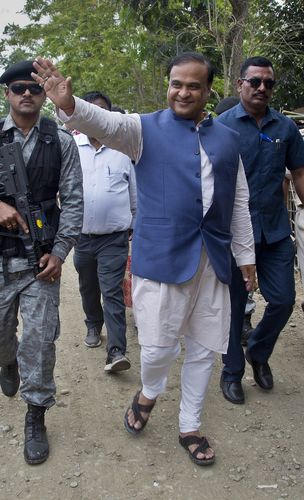The Balakot airstrikes of February 26 have given the BJP a major advantage in the Lok Sabha elections. Till Balakot happened, the BJP was struggling with issues such as agrarian distress, sluggish economic growth and the unemployment crisis. Balakot changed the narrative almost overnight, making national security the dominant theme of the elections.
But what if Balakot had not happened? To minimise its losses, the BJP has been wooing young voters and the middle class by tweaking the tax code. Certain welfare schemes were launched to alleviate the effects of the agrarian crisis. The poor were offered free cooking gas, electricity and new toilets. More importantly, the BJP has also been focusing on effective booth management and targeted campaigning, especially in key states, overseen by the chosen lieutenants of Prime Minister Narendra Modi and party president Amit Shah. These key leaders were given the overall charge of energising party workers, coordinating campaigns down to the booth level and pushing a polarising narrative to maximise Hindu votes in key states to compensate for the potential loss of seats in areas where the BJP had reached saturation levels in 2014. Five of these handpicked leaders are Gordhan Zadafia (Uttar Pradesh), Suresh Pujari (Odisha), Sunil Deodhar (Andhra Pradesh), Arvind Menon (West Bengal) and Himanta Biswa Sarma (northeast).
It is a Modi tsunami across India
Gordhan Zadafia does not look like a typical sangh leader. He is married, was a successful diamond merchant, and kurta-pyjamas are not part of his wardrobe. “My colleagues often tell me that I do not look like a politician. I tell them I don’t need to look like one,” said Zadafia, deftly handling morning visitors at his Lucknow residence.
When Narendra Modi became chief minister of Gujarat, he brought in Zadafia as home minister. Known for his honesty, he even declined to draw his government salary. Zadafia was, however, dropped from the cabinet after the 2002 riots. He rebelled and floated his own party in protest. Modi brought him back into the BJP in 2014. Insiders believe that had Zadafia not quit the BJP, he would have been in party president Amit Shah’s position today.
Although he is usually reluctant to speak to the media, especially about his decision to quit the BJP, Zadafia opened up to THE WEEK, saying it was wrong to leave the party. “It was a mistake and misunderstanding. I was a Modi fan, but I had issues with some people. That has been resolved. I lost 10 valuable years of my political life because of that misunderstanding,” said Zadafia. “I remain a hardcore Modi fan. I have always been a Modi fan.”
After campaigning successfully for the BJP in Uttar Pradesh during the 2014 Lok Sabha and 2017 assembly polls, Zadafia was named party in-charge of the state. His connection with Uttar Pradesh goes back a long way. In 1989, he was among the senior functionaries of the Vishva Hindu Parishad who performed shilanyas (foundation stone laying) for a Ram temple in Ayodhya. Today, one of Zadafia’s main tasks is to manage relations with sadhus in the temple city who are angry with the BJP for the delay in building the Ram temple. He keeps on reminding them that notwithstanding the delay, the BJP remained the only party capable of building the temple.
Zadafia strongly refuted the allegation that he was sent to Uttar Pradesh to polarise the voters. He said his brief was to unite the state. “UP has a culture. It is rich in resources. But the state has remained malnourished. I will have to help the party to turn it into Uttam Pradesh,” he said. He blamed the mahagadhbandhan for polarising the voters.
Zadafia’s influence was evident from the manner in which the BJP dropped several sitting MPs. Zadafia said the decisions were made by the party’s parliamentary board. “The MPs were expected to play a bigger role in taking forward the prime minister’s pet projects. I admit it is not possible to visit every village in their constituencies. But, somehow, you need to reach out to people. Those who did that got the tickets,” said Zadafia. He was confident that the BJP would sweep the elections. “Earlier it was a Modi wave,” he said. “This time, it is a Modi tsunami across India.”
Let there be violence, and we will retaliate
Suresh Pujari was once the chief liaison between the BJP and the Biju Janata Dal in Odisha. Now, he is among the principal challengers of Chief Minister Naveen Patnaik. According to Pujari, the BJP failed to flourish in Odisha because senior leaders like A.B. Vajpayee and L.K. Advani went out of the way to accommodate Patnaik, in order to keep the Congress out.
“They patronised Patnaik and I was asked to toe the line. Patnaik was, in fact, groomed by Vajpayee and Advani, and not by his father, who did not want him to be in politics,” said Pujari. But following the Kandhamal riots in 2008, Patnaik chose to end the alliance with the BJP.
The riots saw Pujari’s stock rise within the BJP. He stood by his men who were accused of rioting, and put pressure on Patnaik to spare them. Riots broke out in Kandhamal after a seer associated with the VHP, Swami Lakshmanananda Saraswati, and four of his associates were murdered. Pujari said the seer was facing threats from Maoists and Christian missionaries. “Maoists failed to turn Kandhamal into a red corridor because of him. There was a perception that minorities were behind the murders. The violence was in retaliation,” said Pujari. He dismissed Patnaik’s claim that the BJD broke the alliance because of the riots. “The riots began on October 23, 2008. But he waited for six months before walking away.”
Pujari’s political activism started in his student days. He became famous after leading an agitation demanding fee waiver for poor college students. The agitation turned violent and ultimately the government had to budge. Pujari joined the BJP in 1997, and became president of the state unit of the party in 2006. During the Kandhamal riots, he was accused of inciting Hindus. Pujari said he had appeared before two commissions which investigated the riots, but the Patnaik government was yet to release the reports. “When we form our government, the first thing we are going to do is to table the reports,” he said.
Pujari said the BJP would sweep Odisha, but conceded that West Bengal would be far more difficult. Along with Odisha, he is also in charge of West Bengal’s western belt including Purulia, Bankura and Midnapore. He said BJP workers were targeted by the Trinamool. “But that helped us fight back. Let there be violence, and we will retaliate. It helped open the gates for the BJP,” said Pujari. “Chief Minister Mamata Banerjee united the Hindus in Bengal.”
Pujari mocked what he called Mamata’s gestures towards appeasing the Muslim community. “She wore hijab, offered namaz and openly curtailed religious rights of the majority. She is more popular in Bangladesh than in India. Given an option, the people of Bangladesh would have chosen Mamata instead of Sheikh Hasina.”
Nothing wrong in lifting the Hindu spirit
When Sunil Deodhar promised Narendra Modi that he would defeat the Manik Sarkar government and bring the BJP to power in Tripura, the prime minister asked him to improve his fitness first. “First you lose weight and then defeat him,” said Modi.
Deodhar dutifully followed the prime minister’s advice. He opted for bariatric surgery and brought his weight under control. To cope with the rigours of campaigning, the vegetarian took to eating fish. His determination paid off when in March 2018, the BJP swept to power in Tripura, ending the left’s 25-year-old reign.
Impressed by Deodhar’s accomplishments, Amit Shah gave him the additional charge of Andhra Pradesh, after Chief Minister Chandrababu Naidu pulled out of the National Democratic Alliance. Deodhar started his Andhra mission by shaving his head at the Tirupati temple. He has also been travelling extensively to understand the pulse of the people.
After his travel and interactions, Deodhar realised that religious polarisation was unlikely to work in Andhra Pradesh. “Although Hindus here are more religious, they don’t think of religion during elections. [YSR Congress leader] Jaganmohan Reddy, in fact, is a Christian who gets a considerable number of Hindu votes,” Deodhar said.
But in neighbouring Telangana, he said all bets were off as he felt the All India Majlis-e-Ittehadul Muslimeen of Asaduddin Owaisi was openly campaigning for Muslim votes. “In such cases, we need to think of lifting the spirit of Hindus as well. There is nothing wrong in it.”
But his focus this time was on defeating Naidu, although he felt Jagan, too, was no good. “Both are corrupt. One came out of jail and the other would go to jail soon,” he said. But Deodhar and his team are not averse to Jagan winning this time, thus completely weakening Naidu. His real target is the 2024 assembly elections. “I will bring the BJP to power in 2024. That is my promise to the party president.”
Deodhar seems to be in for the long haul. He is learning Telugu, has started trying Andhra cuisine and has even discarded his kurta-pyjamas for white shirts and trousers. He has also started watching Telugu movies.
His real worry is that the people of Andhra Pradesh are not so keen on national parties, which he said was because of the bitter experiences they had from the Congress. “Delhi has no prominence here,” he said. “But in a few years, I will reverse that.”
There is no kindness left in Mamata Banerjee
On April 18, Arvind Menon was at a small hotel in Siliguri, addressing a small gathering of BJP workers. A few Trinamool workers got wind of it and rushed to the hotel. They destroyed the cars outside, beat up BJP workers and went door to door in search of Menon, the BJP’s co-in-charge of West Bengal. The hotel staff locked him in a room to ensure his safety. State police came soon, but they advised Menon to stay put till central forces came. Finally, under the instructions of the Election Commission, central forces arrived and escorted Menon to safety.
“They were trying to catch Arvindji. If he is hurt or arrested, our chances of winning Bengal will be over,” said Tushar Bose, a BJP worker.
Menon, who was born in Guruvayur in Kerala, speaks fluent Hindi and Bengali. On loan from the RSS, he has been orchestrating the BJP’s Bengal strategy since October last year. Known to be close to RSS sarsanghchalak Mohan Bhagwat, he was said to be the brain behind the BJP’s long tenure in Madhya Pradesh. Impressed by his talent, the party recalled him to Delhi and gave him the charge of as many as 29 departments at the BJP headquarters, including the party’s policy-making cell. Menon played a key role in the Gujarat assembly elections in 2017. Bengal would, however, be the sternest test in his political career.
“This is the toughest place in the country for campaigning. Worse than Bihar and Bundelkhand,” said Menon, who reports directly to Shah. He said the party sent him to Bengal not only to win maximum number of Lok Sabha seats, but also to win the assembly elections in 2021. “I promise I will meet the expectations of the party and win the assembly elections,” he said.
Menon does not believe in high decibel campaigns and sound bites. He is one of the few BJP leaders without a chowkidar prefix on Twitter. His social media presence is limited. He prefers to meet people on the streets, in shops or in villages.
Menon has built up a dedicated team of workers who are present in almost all blocks of Bengal. Based on their feedback, he informed Shah about an achievable target in the Lok Sabha polls. Subsequently, Shah has set a target of 23 seats. Menon said he would ensure that the target was met.
After Menon took charge, the BJP has a presence in all 74,000 booths in the state. Young men and women filled with the spirit of hindutva are active across the state. For nearly all of them, the primary enemy is Mamata.
“Her name is Mamata, which means kindness. But there is no kindness left in her,” said Menon. “She had fought relentlessly against the left, but she forgot all that after coming to power.”
Menon said he would remain in Bengal till Mamata was ousted from power. “Let them attack me and my workers. We are prepared,” said Menon. “But I will go into each and every village and inject the message of change into the minds of the people. We will change Bengal before 2021.”
Hindus may soon be a minority in Assam
Himanta Biswa Sarma was once the rising star of the Congress in Assam. But three years ago, he ditched the Congress and joined the BJP, and soon became Amit Shah’s most trusted lieutenant in the northeast. Sarma handles important portfolios in the Assam government and serves as convener of the 13-party Northeast Democratic Alliance, the northeastern cousin of the NDA. When the Lok Sabha elections were announced, Sarma was hoping to contest from Tezpur. But Shah intervened and asked him to coordinate the BJP campaign in the entire northeast.
Sarma was disappointed, but he chose to move on, and took charge of the BJP campaign. His first move was to bring back the Asom Gana Parishad into the BJP-led alliance. The AGP had walked away following the BJP’s decision to introduce the Citizenship Bill. Sarma, in fact, has been one of the key proponents of the bill, unlike Assam Chief Minister Sarbananda Sonowal, who was opposed to it.
Sarma travelled across Assam and addressed around 80 rallies, building his campaign around the narrative of Hindus in danger in the absence of the Citizenship Bill. “Unless something is done, Assam would become another Kashmir where Hindus will be a minority,” said Sarma. The U-turn by Sarma, who was once an avowed secularist, has shocked a lot of people.
Said Aminul Islam of the All India United Democratic Front, “Sarma feels Assam will become a Taliban state if Muslims stay. He wants to get closer to the RSS and gain attention.” Sarma’s polarisation project seems to be paying off. Islam said the BJP was likely to win five to six seats. “And that is because of Sarma and his tireless campaign.”
It was Congress leader Hiteswar Saikia who brought Sarma, a brilliant student with a PhD, to the political mainstream. Sarma worked closely with Saikia and Tarun Gogoi and played a key role in ensuring the Congress supremacy in Assam. As a minister, he handled important portfolios. But when the BJP gained upper hand in Assam under Sonowal’s leadership, he jumped ship. The Sonowal-Sarma combination swept Assam in the assembly elections in 2016. Sarma did not get the top post or the post of deputy chief minister, although he was given important portfolios such as finance. He played a key role as an organisation man for the BJP, keeping the Congress out of power in Nagaland, Mizoram and Meghalaya. He also helped the party seize power in Tripura.
Sarma is, however, keen to shift base to national politics. If Modi returns to power, he is likely to get a plum position in Delhi. Sarma is working hard to ensure that he gets his due this time. Once the polling was over, he flew to Delhi. His mobile phone was switched off for a while. When asked what he was doing in Delhi, a senior leader of the BJP said, “Sarma is in Delhi to seal his own future.”






